The benefits of fuel-efficient cookstoves are clear as mud
27 March 2023
Within the RFS programme, gender is a cross-cutting theme incorporated into the design and implementation of each project. Gender-responsive approaches enable each RFS project to work towards gender equality with regards to access to productive resource and services, employment, and decision-making processes within the agriculture sector.
In sub-Saharan Africa, women represent roughly 50% of the agricultural labour force, yet their productivity levels are lower than men due to unequal access to land, credit, inputs, and extension services. Women also work longer hours, ranging from 12 to 13 hours more per week than men. Ultimately, this disparity between men and women impacts not only women, but the community as whole, undermining agricultural productivity, socio-economic development and food security.
In RFS countries, climate change, land degradation, and biodiversity loss affect men and women differently. Even though women are often the primary providers and caretakers within their household, they often have less decision-making power than men. Power imbalances translate to differences in how resources are distributed within households. Women are more vulnerable to water and food shortages, an imbalance that is exacerbated in regions that are impacted by climate change, land degradation, and extreme weather events. With lower levels of formal education, women also lack the access and skills required for generating alternative incomes that could decrease their reliance on agricultural production for household livelihoods and food security.
IFAD estimates that providing women with the same access to productive resources, skills, tools and technologies as men could increase production on women’s farms by 20-30%. Ensuring women’s equal involvement in community-based sustainable land management and natural resources management has been shown to improve land rehabilitation, reverse desertification, and improve socio-economic conditions within communities.
In line with GEF’s ambition to ensure gender equality and promote women’s empowerment across its operations, RFS aims to close the gender gap in agriculture by integrating gender perspectives and concerns into the preparation, design, implementation, and monitoring and evaluation of agricultural projects and programmes. By integrating considerations of gender equality into each stage of RFS project implementation, RFS is working toward the transformation of discriminatory social institutions and practices. Equal access to resources and opportunities for men and women will support the sustainable improvement of agricultural production, food security, and participation in decision-making processes.
Across the RFS programme, project teams have identified the different needs, roles and responsibilities of women within project sites, as well as opportunities for equal engagement with women. The findings of these assessments have been integrated into project implementation in a variety of ways, including the disaggregation of participation targets by gender in M&E frameworks, strategic partnerships with and capacity development of women’s groups, scaling up access to financing for women, offering subsidies on agricultural technologies and natural resource management assets for women, and a focus on supporting income-generating activities for women.
The RFS Ethiopia project is currently engaging gender experts in the development of a gender-sensitive decision support tool, which allows for easy tracking of socio-economic indicators that have gender-responsive changes over the project period. In Nigeria, the RFS project has forged a strategic partnership with the Women Farmers Advancement Network (WOFAN), convening training workshops for extension workers with a focus on ensuring equal access to extension services for women. In Uganda, the RFS project has made a deliberate effort to ensure equal participation of women and men in extension services, working with clan leaders and elders to mobilise women to engage in the RFS-supported Farmer Field Schools.
Explore the RFS Country Projects to see more examples of how RFS countries are implementing gender-responsive activities.
Stories from the Field
Explore our stories from the field to learn more about how RFS country project teams are implementing activities related to the programmatic theme of Gender.
Relevant resources
We have a growing library of reports, briefs, case studies, media, tools and guidelines. Explore all resources related to gender-responsive approaches to get greater insight into our programme activities.
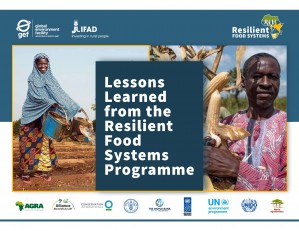
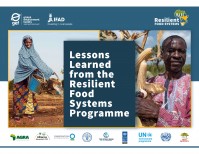
Integrated Approach Pilot (IAP) programmes were conceived as part of the Global Environment Facility (GEF) 2020 Strategy to test the delivery of integrated approaches that address discrete, timebound, complex, global environmental challenges. In its Sixth Replenishment Cycle (GEF6), three IAPs were funded: Sustainable Cities, Taking Deforestation out of Commodity Supply Chains, and Fostering Sustainability and Resilience for Food Security in Sub-Saharan Africa, also known as the Resilient Food Systems (RFS) programme.
The RFS programme serves as an outstanding example of different partners and countries with distinct mandates joining forces to pursue a shared objective, leveraging their respective strengths to transform food systems in Africa. It highlights the significance of clearly articulating the programme’s vision, establishing a well-defined division of labour, and delineating roles and responsibilities from the outset, forming the foundation for an accountability framework. Moreover, the RFS underscores the importance of adopting a nexus approach that integrates food security, agriculture, environment, socio-economic, and climate considerations.
This holistic approach recognizes the interconnectedness of these sectors and the need for holistic solutions. The RFS’s systems-based approach brings together multiple partners at different levels and fosters information flows in both directions, supporting collaboration and knowledge sharing.
This publication presents some of the main lessons learned from the RFS programme, which lasted for six years between 2017 and 2023. It provides a reflection on the implementation, lessons learned, and observations around the key components of the RFS. The programmatic value-add of the RFS and the manner with which it was harnessed during implementation is conveyed through case studies drawn from the experience of the country projects across these components.
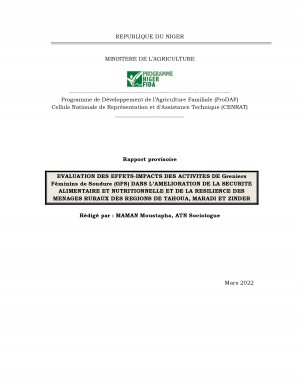
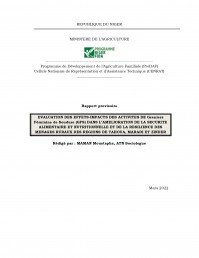
To better understand the impact of Women's Welding Granaries in the RFS project sites, the National Representation and Technical Assistance Unit (CENRAT), and the Family Farming Development Programme (ProDAF) conducted a survey to see what the effects have been on the ground.
In total, the project targets 3669 GFS members (45% in Maradi, 31% in Zinder and 24% in Tahoua) with 8 villages per region practising GFS. 244 women were surveyed in the study, including men’s focus groups in each village to form a holistic impression of the impact.
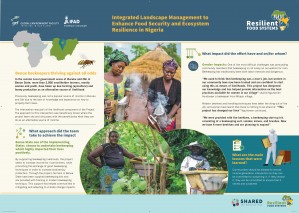
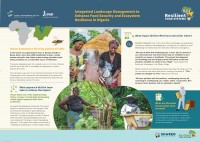
The 2022 Resilient Food Systems Knowledge Exchange and Learning Workshop included an interactive experience-sharing wall, featuring impact posters across RFS countries and components of the Regional Hub.
This poster was prepared by the Integrated Landscape Management to Enhance Food Security and Ecosystem Resilience in Nigeria project.